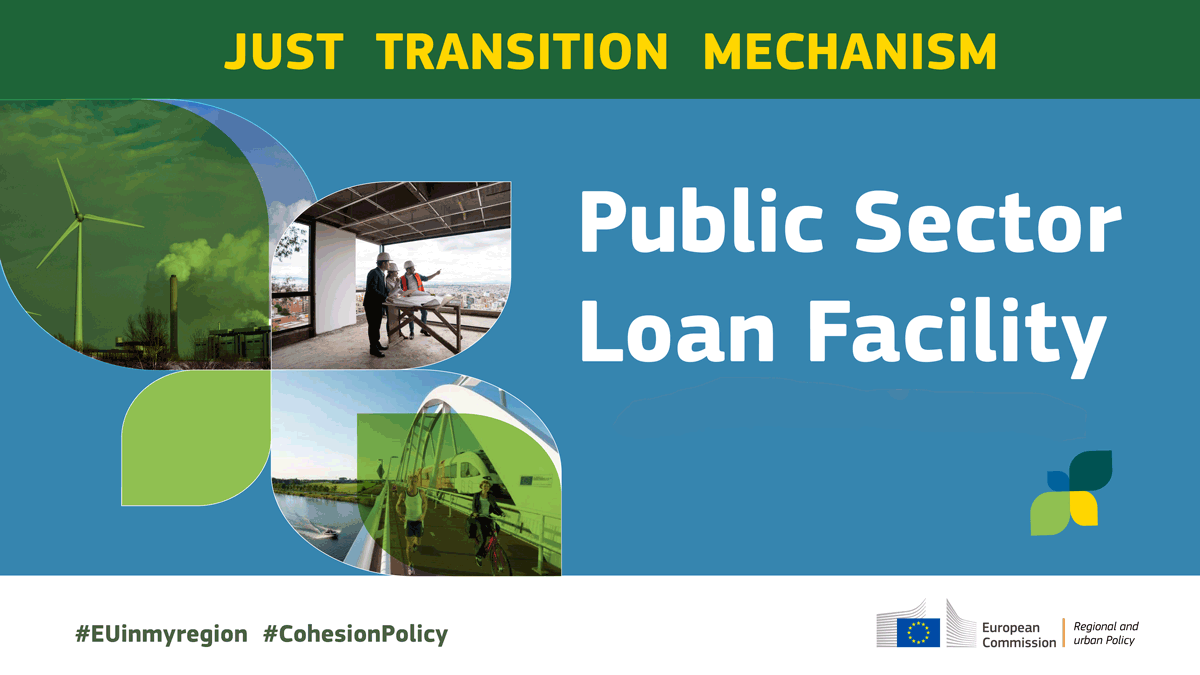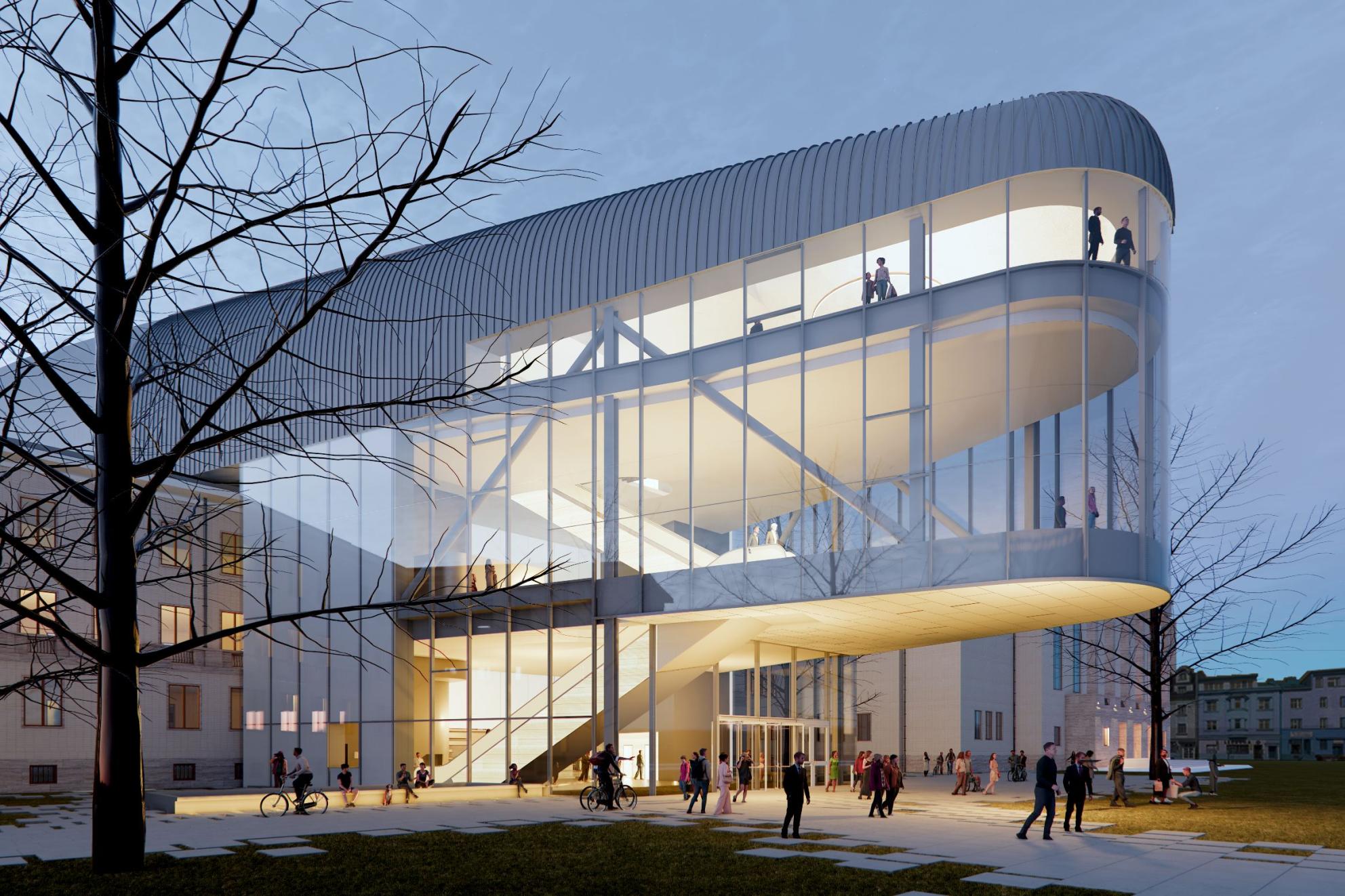
Reaching the goals of the European Green Deal means ending environmentally harmful activities. This transition may trigger short term social and economic costs in territories undergoing heavy decarbonisation process.
The question is how to achieve this without harming people’s livelihoods? To be successful, the transition needs to reduce inequalities, create new decent jobs, and strengthen competitiveness while remaining fair. Instruments like the Public Sector Loan Facility aim to make this possible, by harnessing the transition towards a climate-neutral economy as a source of new economic opportunities, with significant potential for job creation.
Enhancing cohesion and economic diversification through public investment
The PSLF blends € 1.3 billion worth of grants from the European Commission with an estimated € 6 to 8 billion in loans from the European Investment Bank (EIB). Such public investment is expected to act as a catalyst by encouraging investments by public sector entities addressing social, economic or environmental challenges arising from the green transition. These investments can cover a vast range of sustainable investments including, but not limited to, those related to energy, energy efficiency, mobility, environment infrastructure, social housing and digitalisation.
In Sweden’s Västerbotten County, a project supported by the PSLF called SHERIS entails the construction of approximately 750 energy-efficient social housing units in the city of Skellefteå, formerly a centre of mining and heavy industry.
On the subject of how the project fits into the region’s just transition strategy, SHERIS project coordinator Gustaf Ulander says:
“The project directly impacts highly important strategy areas that show the vital connection between living spaces and the support of the new green industries”.
Another beneficiary of the PSLF is the Pays de la Loire Region in North-Western France. A blend of loan and grants allowed to overhaul the sustainable transport infrastructure of the city of Nantes. Here the PSLF contributed to the upgrade of 3 tram lines and the addition of 46 new vehicles, as well as transformative investment in multimodal exchange hubs and cycle-paths.
Reached for a comment, Jocelyne Jeannau, from the Nantes Métropole Finance Deaprtment, stated that the EIB loan presents many advantages, like highly favourable financing conditions (at cost price) and diversification of lenders. In addition to that, the funding was significant (€200M) and is available over 4 years, depending on the progress of the funded projects. Moreover, the project had access to a 15% grant on the loan amount (€30M). Ultimately, by supporting mobility in the region and reducing car usage, the investment supported environmental sustainability and territorial cohesion.
Another example is a set of in a lignite mining area of West Macedonia, Greece. This is the project named Social-Economic Transition of Western Macedonia, bringing together 15 projects in six municipalities.
When asked what made the Public Sector Loan facility attractive, Project Coordinator Theodore Theodoropoulos responded: The Region of Western Macedonia is trying to adapt to the conditions created by de-carbonisation, by mitigating the negative effects and creating conditions for changing the productive model of the region.
Since the Just Transition should be achieved smoothly and quickly, we need to act on the short term, having the necessary financial resources secured.
Thus, the Region sought funding from other tools besides the classic ones and sought to utilize the European Just Transition Mechanism.
The financing of the "Social-Economic Transition of Western Macedonia" project by PSLF made it possible to directly finance medium-budget projects that were not a priority of classical financing tools, following relatively simple application, monitoring, and disbursement procedures.
A final example comes from Ostrava, a former mining city and steel production site in the Czech Republic. With the support of the PSLF, it is paving the way to the development of cultural infrastructure in the shape of the new Ostrava Concert Hall. An extension of the House of Culture, the Concert Hall will feature world-class acoustics and a capacity to welcome 1300 spectators. This will create a space for cultural, social, and economic development in the city of Ostrava.
Panorama spoke to Lucie Kajnarová, a spokesperson for the project, who explained how the Concert Hall is expected to shape a new identity for the city:
“The construction of the Ostrava Concert Hall represents a significant step in shaping the post-mining identity of the region, positioning it as a forward-looking, culturally vibrant, and environmentally sustainable city. For decades, Ostrava's identity was tied to its mining and industrial past, but the city's commitment to transformation—especially through cultural and environmental revitalization—is laying the groundwork for a new narrative.
Designed by Steven Holl Architects and Architecture Acts, it will be an architectural landmark, enhancing the city's cultural and aesthetic appeal. The hall is part of a broader effort to improve public spaces and quality of life, integrating sustainability through renewable energy sources. This emphasis on green initiatives will help Ostrava transition into one of the Czech Republic’s greenest cities, reinforcing its new identity focused on innovation and ecological responsibility.

Eligible applicants and types of support available, including technical assistance
Public and private bodies with a public service mission can apply for support in the territories most negatively impacted by the transition and covered by a territorial just transition plan. Developed by Member States, the plans set out challenges in each territory which projects must address.
Loan requests must be sent to the EIB and can be submitted at any time. Loans are provided by the EIB or its financial intermediaries. The minimum loan amount is € 1 million for a loan when applying through an EIB financial intermediary, and € 12.5 million for direct EIB loans. The EIB loans typically cover 50 % of project costs but the EIB may cover a higher share of the costs for projects in less developed regions.
To apply for grants, applicants must submit project proposals to the European Commission, with multiple deadlines until end 2025. A second call will be launched in 2026 which will have multiple deadlines until end 2027. Each award is a combination of a grant and a loan, with the grant accounted as 15 % of the loan, or 25 % for projects in less developed regions.
Support for project preparation, development and implementation as well as providing capacity building for beneficiaries is also available, free of charge, under the InvestEU Advisory Hub.
Catalysing a Just and Sustainable Transition
The Public Sector Loan Facility (PSLF) plays a crucial role in ensuring that regions facing the toughest challenges in the green transition are not left behind. By blending grants and loans, the PSLF provides essential financial backing for projects that might otherwise struggle to attract investment, especially in vulnerable areas.
This approach not only supports economic revitalisation but also fosters innovation and environmental sustainability. Ultimately, the PSLF exemplifies how targeted public investment can drive long-term, transformative change, helping regions move beyond their industrial pasts and build a resilient, low-carbon future.
Nonetheless, the Public Sector Loan Facility is but one pillar out of the three that compose the Just Transition Mechanism, together with the Just Transition Fund and InvestEU, composing the toolbox Europe needs to expedite the Green Transtion and testifying the EU’s commitment to ensure the transition is fair, leaving no one behind, in the best tradition of cohesion policy.
Find out more
https://ec.europa.eu/regional_policy/funding/just-transition-fund/just-transition-platform_en
https://cinea.ec.europa.eu/just-transition-mechanism_en
https://investeu.europa.eu/investeu-programme/investeu-advisory-hub_en